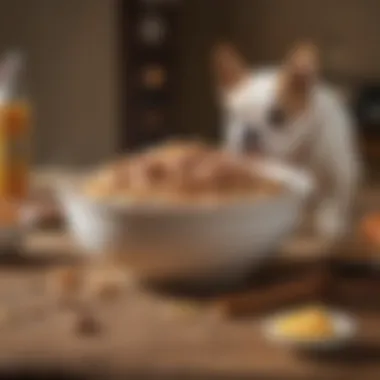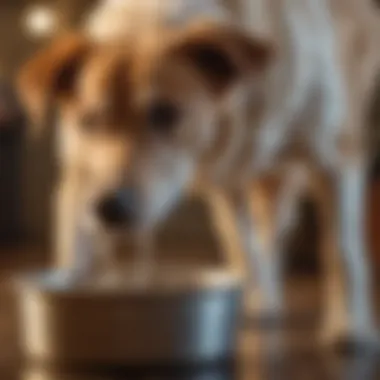Essential Dietary Choices for Dogs with Diarrhea


Intro
When a dog experiences diarrhea, it can be a distressing time for both the pet and its owner. Understanding the appropriate measures to take regarding their diet is crucial. This guide explores what to feed your dog during this uncomfortable period, ensuring it receives the necessary nutrients while avoiding further complications. As responsible pet owners, knowing how to properly care for our canine companions during gastrointestinal distress is essential to their recovery and overall health.
Understanding Your Pet
Breed Traits
Different dog breeds may have varied gastrointestinal sensitivities. Some breeds might be more prone to digestive issues, affecting their dietary needs. For example, smaller breeds like Chihuahuas may react differently than larger breeds such as German Shepherds. Understanding these breed-specific traits can help in making informed dietary choices when your dog suffers from diarrhea.
Common Temperaments
A dog's temperament can impact its reaction to illness. Some dogs may become anxious when unwell, which could further aggravate their condition. Monitoring their behavior can provide insight into whether they are merely experiencing diarrhea or if other underlying issues might be present. A calm demeanor may indicate that the dog is coping well, while signs of restlessness might necessitate further observation.
Special Needs
It is vital to consider if your dog has any special dietary needs due to existing health conditions. For example, dogs with food allergies or intolerances may require specific food choices when experiencing diarrhea. Consulting with a veterinarian will provide you with targeted recommendations for your pet’s unique situation.
Pet Care Essentials
Nutrition and Feeding Guidelines
When your dog has diarrhea, focus on feeding them bland foods. White rice, boiled chicken (no skin or bones), and pumpkin can be effective in easing your dog's digestive upset. These foods are gentle and can help bulk up the stool.
It is essential to introduce any new diet gradually, even during recovery. Sudden changes can lead to additional gastrointestinal upset.
Grooming Tips and Techniques
After a bout of diarrhea, ensure your dog's fur is clean. This is particularly important for long-haired breeds where fecal matter can get caught in their coat. Regular grooming can help maintain hygiene and comfort.
Health and Wellness
Hydration is essential during this time. Always provide fresh water and consider offering an electrolyte solution designed for pets. Ensure that you monitor their water intake closely. If your dog shows signs of lethargy or continues to have diarrhea after 24 hours, consult your vet.
Training and Behavior
Basic Training Techniques
Reinforcing good bathroom habits can be beneficial during this period. Take your dog out frequently, as they may need to relieve themselves more often.
Behavioral Problems and Solutions
Diarrhea can sometimes lead to behavioral issues, like decreased appetite or reluctance to move. Observe your pet closely for any signs of discomfort or pain.
Mental Stimulation Activities
Keep your dog's mind engaged without overexerting them. Simple puzzles or gentle games can help distract from discomfort while they recover.
Engaging with Your Pet
Interactive Games and Toys
When your dog is recovering, engage them in gentle play. Choose toys that are soft and suitable for their condition.
Safe Outdoor Activities
If your dog feels up to it, short walks can provide beneficial fresh air. Avoid strenuous activities until they fully recover.
Family-Friendly Pet Interactions


Encourage calm and gentle interactions with family members. Avoid roughhousing, as this could upset their sensitive stomach further.
Pet Adoption and Integration
Choosing the Right Pet for Your Lifestyle
When considering a new dog, think about their dietary needs and health considerations, especially if you have young children or other pets.
Preparing Your Home for a New Pet
Before bringing a new pet home, ensure you have the necessary food options ready, particularly if they have special dietary needs. Knowing how to react during episodes like diarrhea will help promote a healthy environment.
Tips for Smooth Prolusion
If integrating a new pet while caring for one with diarrhea, manage interactions carefully to avoid spreading any potential infections.
In summary, understanding what to feed your dog during diarrhea is vital. Focus on bland, easily digestible foods and maintain good hydration. Always stay alert for any signs of serious illness and consult your veterinarian if symptoms persist.
Understanding Diarrhea in Dogs
Understanding diarrhea in dogs is critical for pet owners who want to provide adequate care during times of gastrointestinal distress. This section delves into the definition of diarrhea, its symptoms, potential causes, and the situations when it becomes a concern. Recognizing these elements can help owners make informed decisions about their dog's health.
Definition and Symptoms
Diarrhea in dogs is defined as an increase in the frequency and fluidity of stools. This can manifest in various ways, including soft, runny, or watery stools. Common symptoms accompanying diarrhea may include lethargy, decreased appetite, or abdominal discomfort. It is important for pet owners to monitor these changes closely, as they can be indicative of underlying health problems.
Possible Causes of Diarrhea
Dietary indiscretion
Dietary indiscretion is a common cause of diarrhea in dogs. It refers to the consumption of inappropriate items, such as table scraps, garbage, or plants. This factor is significant as it highlights the necessity for proper dietary choices. The key characteristic of dietary indiscretion is its unpredictability; dogs often consume things they should not, leading to upset stomachs. The main advantage of identifying dietary indiscretion is that it is often easily rectified by removing access to inappropriate food sources.
Infectious agents
Infectious agents can also lead to diarrhea in dogs. These include bacteria, viruses, and fungi that can disrupt the gastrointestinal tract. The key feature of infectious agents is their potential to spread among dogs, especially in places like shelters or parks. Understanding this aspect is beneficial as it encourages vaccination and preventive health measures. However, diagnosing infections may require veterinary intervention and can lead to complications if not treated appropriately.
Parasites
Parasites such as worms can contribute to diarrhea in dogs. These organisms inhabit the intestines and utilize the dog’s nutrients, resulting in gastrointestinal upset. The unique aspect of parasites is that they often go unnoticed until symptoms like diarrhea appear. Identifying parasites early can be crucial, as they can lead to more serious health problems if left untreated. Regular fecal exams can help ensure that dogs remain free from these unwanted guests.
Underlying health conditions
Underlying health conditions can also manifest as diarrhea in dogs. Issues such as pancreatitis, liver disease, or inflammatory bowel disease may cause digestive disturbances. The key characteristic of these conditions is that they often require more than just dietary changes; medical intervention may be necessary. Recognizing the possibility of underlying health conditions emphasizes the need for routine veterinary check-ups, which can help in early diagnosis and treatment of serious issues.
When Diarrhea Becomes a Concern
Duration and frequency
The duration and frequency of diarrhea are crucial to monitoring its progress. Typically, diarrhea lasting more than 24 hours or occurring multiple times a day warrants careful observation. The main advantage of tracking these patterns is that it helps distinguish between simple dietary upset and more serious health issues. A prolonged episode can lead to dehydration and requires prompt veterinary attention.
Presence of blood or mucus
The presence of blood or mucus in the stool is another sign that diarrhea may have become serious. Such symptoms can indicate various underlying issues, ranging from infections to more severe conditions like hemorrhagic gastroenteritis. Understanding this aspect is critical, as it can help owners take rapid action. Any sign of blood or abnormal mucus should prompt a consultation with a veterinarian to assess the dog's health.
Accompanying symptoms like vomiting
Accompanying symptoms, such as vomiting, can enhance the concern surrounding diarrhea. When a dog experiences both diarrhea and vomiting, it often leads to a rapid loss of fluids, increasing the risk of dehydration. The unique feature here is that combined symptoms often signal a more serious issue. Observing these additional signs can guide owners in seeking veterinary care in a timely manner.
The Importance of Hydration


Hydration plays a crucial role in the overall health of your dog, especially when it is experiencing diarrhea. Diarrhea can lead to significant fluid loss, increasing the risk of dehydration. When a dog is dehydrated, it can develop more severe health problems, making it essential for pet owners to ensure their furry companions stay hydrated during episodes of gastrointestinal distress. This section highlights the signs of dehydration and methods to encourage fluid intake.
Signs of Dehydration
Identifying dehydration in dogs is important for timely intervention. Common signs include:
- Dry gums: Healthy gums should be moist and pink. If they feel dry or sticky, it may indicate dehydration.
- Loss of skin elasticity: Gently pinch the skin at the back of your dog's neck. If it does not snap back quickly, your dog could be dehydrated.
- Panting or lethargy: An unusual amount of panting or lack of energy can suggest your dog is not getting enough fluids.
Recognizing these signs early can enable you to take the necessary measures to address the dehydration.
Encouraging Fluid Intake
When your dog has diarrhea, keeping it hydrated should be a priority. Here are effective strategies to encourage fluid intake:
You can provide water
Providing fresh water is the simplest and most natural method for hydration. Always ensure your dog has access to clean water, as it encourages drinking. Fresh water is easily digestible and does not cause further gastrointestinal distress. If your dog refuses to drink water, you might try adding small amounts of low-sodium broth to make it more appealing. Remember that proper hydration aids in recovery from diarrhea and supports overall health.
Consider using electrolyte solutions
Electrolyte solutions can be beneficial for dogs suffering from diarrhea, as they help replace lost minerals and fluids. These solutions typically contain essential electrolytes like sodium and potassium, which are vital for maintaining hydration. Specially formulated electrolyte solutions for pets can be found at most pet stores or veterinary clinics. Using these solutions helps restore balance and can speed up recovery. However, consult with your veterinarian to determine the appropriate type and amount for your dog.
Keeping your dog hydrated during diarrhea is essential to support recovery and prevent more severe health issues.
Encouraging hydration either through water or electrolyte solutions can significantly aid in your dog's recovery. Always monitor your dog's behavior and conditions closely and make adjustments as necessary.
Homemade Diet Solutions
Homemade meals allow pet owners to control ingredients. This can be particularly helpful for dogs with dietary sensitivities or allergies.
Creating a balanced meal
When preparing homemade meals, it’s essential to ensure balance. A combination of protein, carbohydrates, and moderate fats is necessary. Utilizing ingredients like boiled chicken, plain rice, and vegetables can offer essential nutrients. The key characteristic is customization; owners can adjust meals according to their dog's needs. However, balancing homemade meals may require research to avoid nutritional deficiencies.
Monitoring ingredients for allergens
Monitoring ingredients helps avoid surprises. Allergens can trigger digestive distress, worsening diarrhea. The key characteristic is careful selection of ingredients known to be safe for the individual dog. Identifying problematic components is essential, particularly in previously fed commercial foods. One advantage is that it enhances awareness of food reactions. However, the process can be time-consuming, requiring diligence in monitoring pet's responses.
Feeding Practices During Diarrhea
Feeding practices during diarrhea are a crucial aspect of managing your dog's health in such a delicate time. When a dog experiences diarrhea, its digestive system is compromised. This can cause further irritation or stress if not handled properly. Adjusting feeding practices helps in facilitating recovery while minimizing discomfort.
Feeding Frequency and Portions
Deciding how often to feed your dog while it suffers from diarrhea involves a balance. Generally, it's advisable to offer smaller, more frequent meals rather than larger portions at once. This approach prevents overloading the digestive system and gives it a chance to recover progressively.
- Smaller portions allow the dog’s body to process the food more efficiently without causing additional strain to an already sensitive gastrointestinal tract.
- Feeding four to six times a day can be helpful. These smaller and frequent meals support the digestive process without overwhelming it.
- Monitor your dog's response after each feeding. If the diarrhea persists, it may be necessary to adjust both the portion size and frequency further.
Timing of Food Prolusion
Introducing food back into your dog’s diet should be done with caution. After a period of fasting, usually about 12 to 24 hours, it’s important to monitor your dog's readiness. Some signs to consider include:
- Returned interest in food
- Consistency of stools begins to change positively
When reintroducing food, begin with bland options. This helps in ensuring that the stomach can handle food without irritation. Begin by offering a very small amount, waiting at least 12 hours to see how your dog reacts. Gradually increase the quantity of food if no adverse reactions take place. It is generally helpful to start with food that is easy to digest, like plain boiled rice or chicken.
Keep in mind, each dog's recovery will be unique, so observe your pet closely during this period.
This careful timing and method of food introduction can ensure that the digestive system does not go into shock or become more inflamed. Continuous assessment will be beneficial to determine the best approach for your individual dog.


Monitoring Your Dog's Progress
Monitoring your dog's progress when it has diarrhea is essential for understanding how well your chosen diet and care practices are working. This section will explore the specific elements that indicate improvement or a need for further action. Recognizing changes in your dog's condition can prevent complications and help make informed decisions about their health.
Assessing Improvement
Improvement in a dog's condition is marked by several observable changes. This can indicate that the dietary choices made are effective. Owners should keep a close eye on their dog's behavior and bodily functions. Regularly checking on the dog's response to the new food helps determine if further intervention is necessary.
What to Look For
Consistency of stools
Assessing the consistency of stools is a key aspect in monitoring digestive health. Stools should ideally transition from watery to more solid forms. Soft stools or diarrhea lasting longer than a day could signal ongoing gastrointestinal issues. As stools firm up, it often signals that the digestive system is returning to normal function. Making observations over time can provide clarity on whether the current dietary plan is effective.
Overall activity levels
Overall activity levels play a crucial role in evaluating a dog's recovery from diarrhea. A pet that regains energy and engages in normal playful behavior is likely improving. Reduced energy may indicate lingering health issues or inadequate nutrition. Keeping track of activity can provide valuable insights into the dog's well-being during episodes of diarrhea.
Key Takeaway: Focus on both stool consistency and activity levels for effective monitoring. These indicators help shape ongoing care and reinforce dietary adjustments.
When to Consult a Veterinarian
Determining when to seek veterinary assistance can be crucial when your dog has diarrhea. While mild cases may resolve with home care, some situations require professional intervention. Understanding the nuances of your pet's condition can help in making informed decisions.
Indications for Professional Help
There are several signs that indicate a visit to the veterinarian is necessary. These include:
- Persistent diarrhea lasting more than two days.
- Vomiting accompanying diarrhea, especially if severe or frequent.
- Blood or mucus in the stool, which suggests potential underlying issues.
- Lethargy or marked changes in your dog’s behavior.
- Loss of appetite that continues for more than 24 hours.
- Signs of dehydration, such as dry gums or excessive panting.
If your dog displays any of these symptoms, you should consult with a veterinarian immediately. Your pet's health relies on prompt attention.
Diagnostic Tests and Treatments
Veterinarians may perform various tests to determine the underlying cause of diarrhea. These evaluative measures typically include:
- Physical Examination: The vet will assess your dog’s overall health and may palpate the abdomen.
- Fecal Analysis: A stool sample may be examined to check for parasites or infections.
- Blood Tests: Blood work can help identify underlying health issues or infections impacting your dog.
- Imaging Tests: X-rays or ultrasounds may be necessary in some complicated cases to visualize internal organs.
Based on the findings, treatment can vary significantly.
- Medication to address infections or parasites may be prescribed.
- Specialized diets can be suggested to help restore gut health.
- In severe cases, intravenous fluids may be administered to rehydrate your dog.
By seeking timely professional help, you minimize the risks of complications and ensure a better outcome for your dog.
Preventive Measures for Future Issues
Preventive measures are critical in maintaining your dog's health and minimizing the likelihood of future diarrhea episodes. Understanding how diet and routine can impact your dog's gastrointestinal well-being is essential. Owners who focus on preventive strategies often see fewer incidents, leading to a more stable and happier pet.
These strategies include nutritional guidelines, lifestyle changes, and regular veterinary visits. Implementing these proactive measures not only protects your dog's digestive system but also enhances their overall health.
Nutritional Strategies
Diet plays a significant role in your dog's digestive health. By ensuring a balanced and high-quality diet, you can help prevent diarrhea. Here are some key nutritional strategies to consider:
- Choose High-Quality Food: Invest in premium dog food that lists meat as the first ingredient. Avoid fillers that may irritate the digestive system.
- Gradual Diet Changes: If changing your dog's food, do it gradually to allow the digestive system to adjust. A sudden change can lead to gastrointestinal upset.
- Incorporate Fiber: Adding fiber sources like pumpkin puree or sweet potatoes can help regulate bowel movements. Fiber promotes healthy digestion.
Monitoring your dog's response to different foods is also important. Keep a food diary to note any reactions that may indicate allergies or intolerances.
Regular Veterinary Check-ups
Routine veterinary check-ups are essential for maintaining your dog's health. Regular visits help in early detection of potential health issues that could contribute to diarrhea. Consider the following benefits of consistent veterinary care:
- Preventive Care: Routine examinations ensure your dog is up-to-date on vaccinations and preventive medications. This reduces the risk of infections that can cause diarrhea.
- Dietary Guidance: Vets can provide tailored dietary suggestions based on your dog’s individual needs and health conditions. This ensures you are providing the most suitable food.
- Health Monitoring: Regular assessments allow for timely identification of any underlying health issues, such as parasites or gastrointestinal diseases, which can lead to diarrhea.
In summary, preventive measures are vital. They help in reducing the incidence of diarrhea through thoughtful nutrition and regular veterinary care. Taking these steps can lead to a healthier, more robust dog that thrives in both physical and digestive health.



